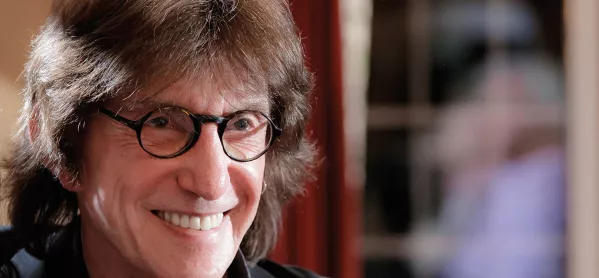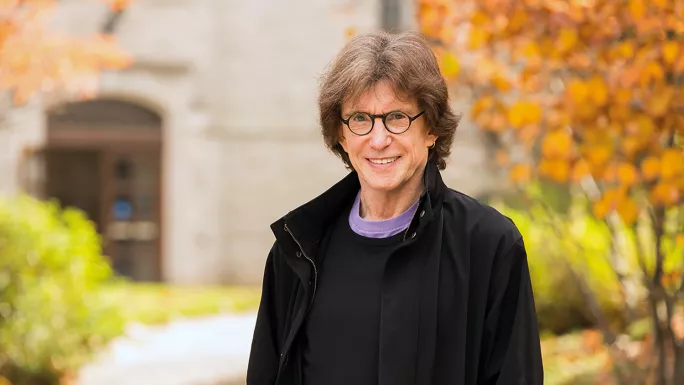
- Home
- ‘Teachers, throw off your oppression’
‘Teachers, throw off your oppression’

Henry Giroux wants teachers to mobilise. He wants them to rise up and launch a revolutionary movement in order to eradicate what he calls a “pedagogy of oppression” that has permeated the education system, both in the UK and in his native US. Teachers and teachers’ unions should work with parents to pressure governments to focus education on creating “informed citizens”, he says, not learning-by-rote simply to get students to pass their exams and become workforce-ready.
This is a push for change that Giroux has been working on for some time. He currently holds the McMaster University chair for scholarship in the public interest, in Ontario, Canada. But he has been an education academic for decades and has penned numerous books. He’s insistent on this course of action because “you cannot have a democracy without an informed citizenry”.
“We live in a culture that thrives on ignorance, refuses to invest in education, flees from the obligations of shared citizenship and ignores what it means to provide a decent life for everyone, especially children,” says Giroux.
“[In this environment,] politics degenerates into a pathology and education is reduced to a form of training.”
The purpose of education
To emphasise his point, he cites the election of Donald Trump - a president who is on record claiming that he “loves the poorly educated”.
“[Trump’s election win] is not just about a crisis of politics; it’s about the crisis of education, it’s about the crisis of civic literacy,” he says. So, how do teachers contribute to putting this right?
As a starting point, he thinks a discussion needs to be had about the true purpose of education. “We need to have a dialogue about what teachers can do to, in a sense, ensure that education is viewed as a public good and that it is tied to a democratic project that would be used to prepare students to be engaged, critical and informed citizens,” Giroux says. “We’ve got to ditch this notion that the only purpose of education is basically to educate people for the workforce or that the most important aspect of education is learning 25 different ways to teach. That’s just silly, it’s reductionistic and it turns teachers into automatons.
“This type of educational reform is really about deskilling teachers and turning education into an adjunct of the corporate workplace. It kills any notion of the imagination, and what we usually end up with is people teaching for the test. We end up with people basically implementing what I call ‘pedagogies of oppression’.”
Giroux explains that a pedagogy of oppression is one that essentially “assaults” a student’s imagination. “It often emphasises memorisation; it places a strong emphasis on harsh forms of discipline; it can result in enormously unproductive and poisonous forms of racism; it usually teaches for the test,” he says. “It embraces standardisation as a measure of knowledge and it does everything it can to basically shut down any sense of curiosity and any sense of teaching students - and teachers, for that matter - what it means to exercise a degree of civic courage, to take risks, to doubt, to in some way be critically conscious of the world, to explore the full capacity of their imagination, and to open the world and themselves in a way in which they can embrace and expand their capacity to be real social-political agents.”

Giroux believes that we should educate educators in a way that enables them to fulfil the “civic purpose” of education.
“I think that increasingly gets lost in the commercialisation, the corporatisation, the commodification and the standardisation of education,” he says. “These are forces that have been highly influenced by a corporate state that doesn’t really recognise the relationship - and doesn’t want to recognise the relationship - between education and democracy, and I think teachers need to seize upon and develop a new language for understanding the purpose of education.”
The link between education and democracy
Giroux identifies another issue: the things that children are being taught in schools typically bear no relation to the world in which they live - a world that is heavily influenced by social media, popular culture and mainstream media.
“To me, this is tragic because when that happens, schools often translate into dead zones of education and spaces of abandonment,” he argues. “They become places that seem irrelevant to young people. They seem to have no meaning except for an elite who need the credentials to get into Oxford, Cambridge, Yale or Harvard.”
He is similarly depressed by what he perceives to be a “deskilling” of teachers that has been brought about by the “audit culture” that pervades the education system in the US and UK. Educators, he believes, should push against or ignore it.
“Teachers can’t just close their door and say, ‘I’m going to do everything I can to avoid this,’” says Giroux. “They need to organise collectively. They need to bring the power of a collective teachers’ union, and the power of working with parents and young people, to begin to put pressure on governments because, in the final analysis, what is at stake here is changing policy. That is, changing policies that are oppressive and endlessly put into play.”
Creating informed citizens
What is important, he says, it that such a reaction is not politically aligned. Giroux explains that “the notion of creating informed and critical students cuts across ideological lines” and that it “should be attractive to anyone who believes that schooling is crucial to creating informed citizens”.
To do this, teachers need to have a clear idea of their larger role in society and this role needs to be self-defined. “Teachers have to become part of a great social movement in which they define themselves as a public resource,” says Giroux.
He argues that, as part of this movement, teachers should fight for policies that advocate more funding for education, more autonomy for teachers and higher pay.
“Teachers should be paid like doctors and they should be professionalised in ways that suggest they are a valued part of any society, which is what they are,” says Giroux. “Schools matter in a democracy and teachers should be one of the most valued groups of people that we have in our society, yet at the same time they are the most belittled, the most dehumanised and the most exploited among professionals - and I think that’s because we have no faith in democracy.
“We can’t seem to make the connection between teaching, education and democracy, and I think that teachers need to make that connection and they need to make it loud and clear. They need to talk about public schools and higher education as democratic public spheres and they need to make clear that what they do is absolutely vital to the nature of society itself - and they need to fight for it.”
Teachers need to pick sides
Although he concedes that he is “utterly pessimistic” about the changes that have taken place to the education system in the US since the 1980s - the public schools sector, in particular - he is quietly optimistic about the future. “I think we’ve reached a breaking point where many people are refusing to accept what we call the ‘school to prison’ pipeline,” says Giroux.
“They’re refusing to accept the racism that goes on in schools with kids being expelled and thrown out of schools, and we have also seen this huge revolt in the US against teaching for the test. More and more people are now realising that education is one of the few protected spaces and battlefronts left over which we can defend any notion of a liberal education. An education that is engaged in creating critical citizens and furthering the parameters of a democratic society.”
Regardless of whether this change is happening as quickly as Giroux feels it must, he is clear that we are at a point where teachers need to pick sides.
“Democracy is in crisis around the world and to address that crisis, education needs to be reclaimed as a moral and political project willing to address the future with a degree of civic courage and educated hope,” he says. “In this case, the struggle to reclaim the democratic function of education is not an option - it is a necessity.”
Simon Creasey is a freelance journalist
Register with Tes and you can read five free articles every month, plus you'll have access to our range of award-winning newsletters.
Keep reading for just £4.90 per month
You've reached your limit of free articles this month. Subscribe for £4.90 per month for three months and get:
- Unlimited access to all Tes magazine content
- Exclusive subscriber-only stories
- Award-winning email newsletters
You've reached your limit of free articles this month. Subscribe for £4.90 per month for three months and get:
- Unlimited access to all Tes magazine content
- Exclusive subscriber-only stories
- Award-winning email newsletters



